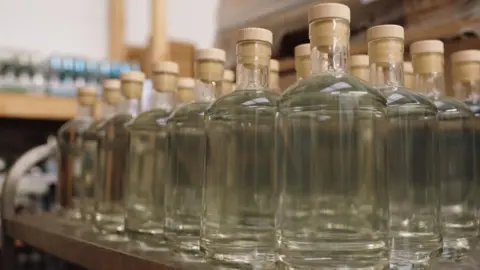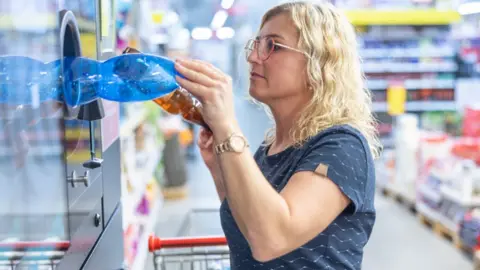Is glass important to Scotland's deposit return scheme?
 Getty Images
Getty ImagesThe Scottish government's Deposit Return Scheme (DRS) could be scrapped after Westminster refused to give the green light for glass to be included.
The DRS will see a surcharge added to the price of single-use products such as glass, which will be refunded when they are recycled.
However, the UK government said this would differ too much from their scheme which is set to be rolled out in 2025.
The Scottish government's Circular Economy Minister Lorna Slater has called this an attempt to sabotage the plans.
In a statement to parliament she said that not including glass in plans made "no sense".
The scheme had originally been due to launch in Scotland in July last year but has twice been delayed amid concern about its implementation from many businesses which would be affected.
UK-wide scheme
The UK government has plans to roll out its own deposit return scheme in England, Wales and Northern Ireland by 2025. Apart from the timescale, the main difference between the two proposals is the exclusion of glass.
Like the Scottish plans, the scheme aims to boost recycling rates by adding 20p to the price of a single-use bottle or can, which will be refunded to people who return it to a retailer or hospitality premises that offer single-use products.
In England and Northern Ireland the scheme will only include polyethylene terephthalate (plastic) bottles, steel and aluminium cans.
Wales has the inclusion of glass listed in its proposals, but is yet to apply for, or be granted an exclusion from, the Internal Market Act to allow this.
 Getty Images
Getty ImagesAn exemption to the Internal Markets Act is needed because of concerns that differing schemes would effectively introduce trade barriers in different parts of the UK.
The argument has raised questions about whether the scheme should go ahead without the inclusion of glass to prevent it being delayed any longer.
The British Soft Drinks Association has backed a UK-wide DRS saying it is the only "viable option".
British Glass, an organisation which represents glass manufacturers in the UK, has said glass recycling can be improved without a DRS.
On social media the organisation said: "Kerbside collections can be improved in Scotland and the powers contained in the forthcoming Circular Economy Bill and through UK-wide EPR (extended producer responsibility) can achieve even higher glass recycling rates.
"Wales has already achieved this without including glass in a DRS."
In 2022, 67% of municipal waste in Wales was recycled, making it the highest performing UK nation when is comes to recycling.
Glass recycling in Scotland
Currently, in Scotland recycling is the responsibility of local authorities.
Recycling services differ by council areas. Some offer kerbside collection for recycling of all types, while others say this is too costly.
Glasgow City Council offers kerbside glass collection for houses - but not flats - through a purple bin, which is collected every eight weeks.
In Edinburgh, glass is collected in much smaller hand-held bins and East Renfrewshire has a monthly grey bin collection.
West Lothian council does not offer kerbside collection, citing the forthcoming introduction of the DRS as a reason for this.
Instead, residents are asked to use bottle banks and recycling centres to dispose of glass. The council also says the high cost of infrastructure, such as investing in new bin lorries to offer this service, is a reason the service is not offered.
Highland Council does not offer kerbside glass collection, while it is only available in some parts of Argyll and Bute.
The Scottish government estimates that about 63% of glass bottles in Scotland were recycled in 2020.
